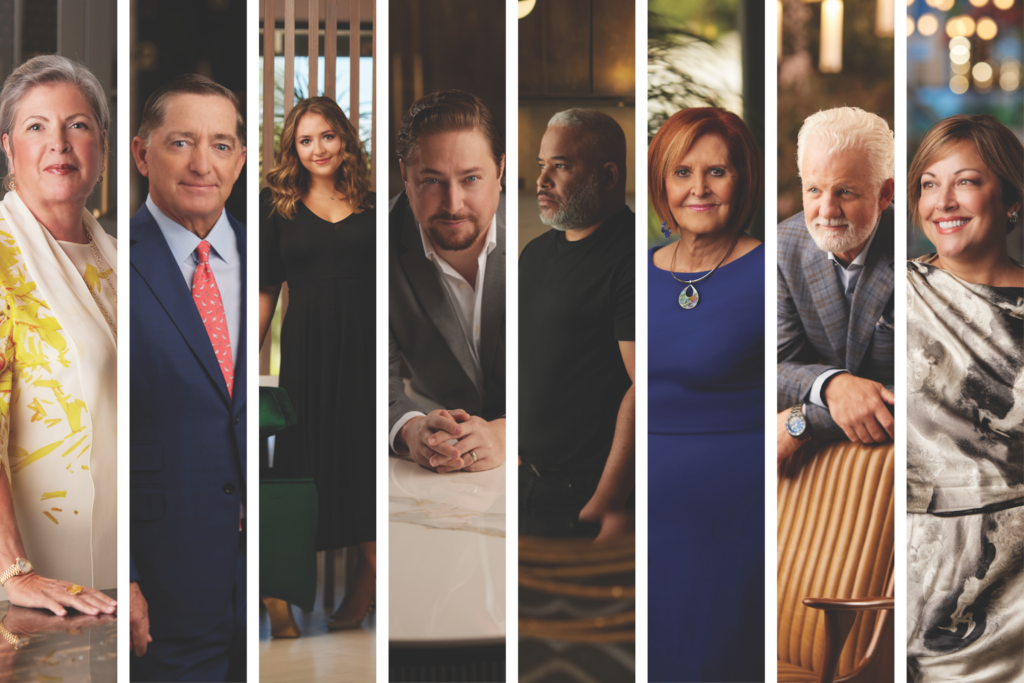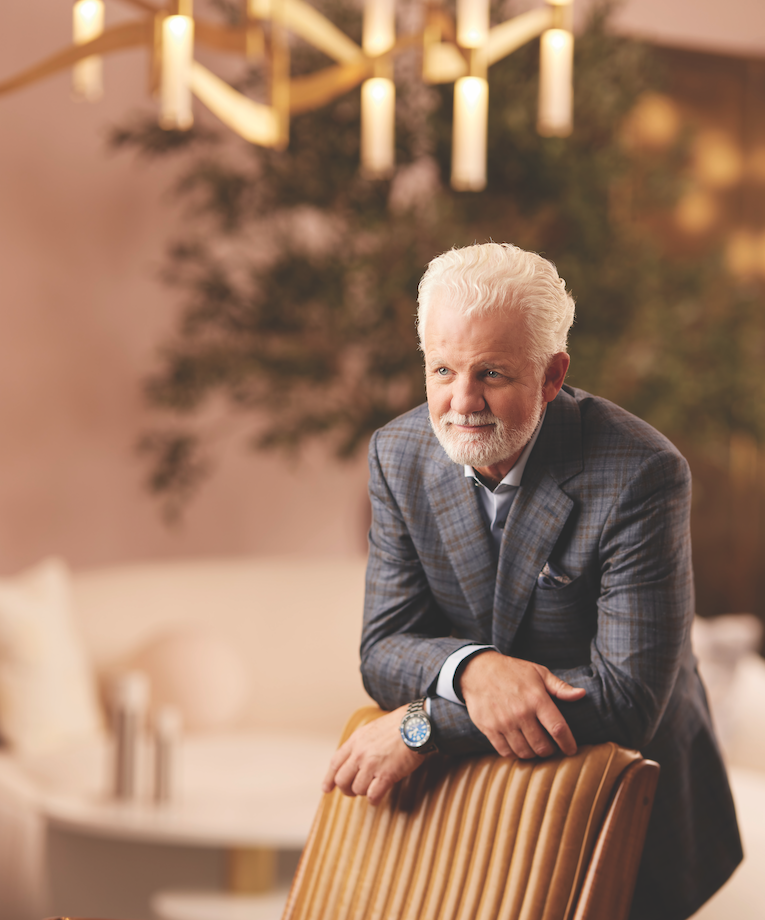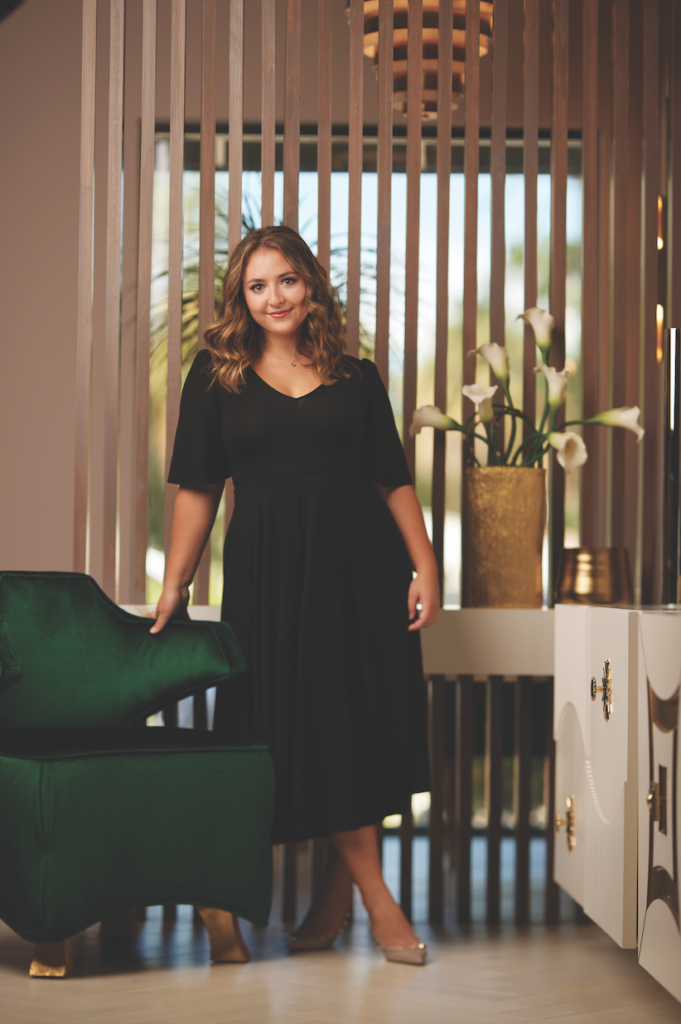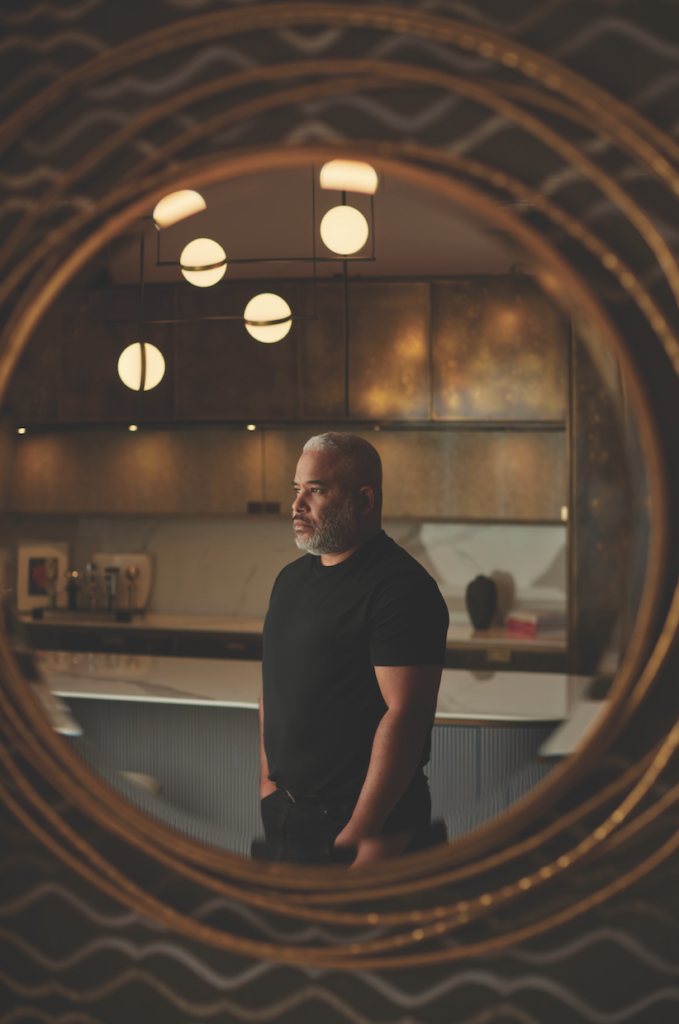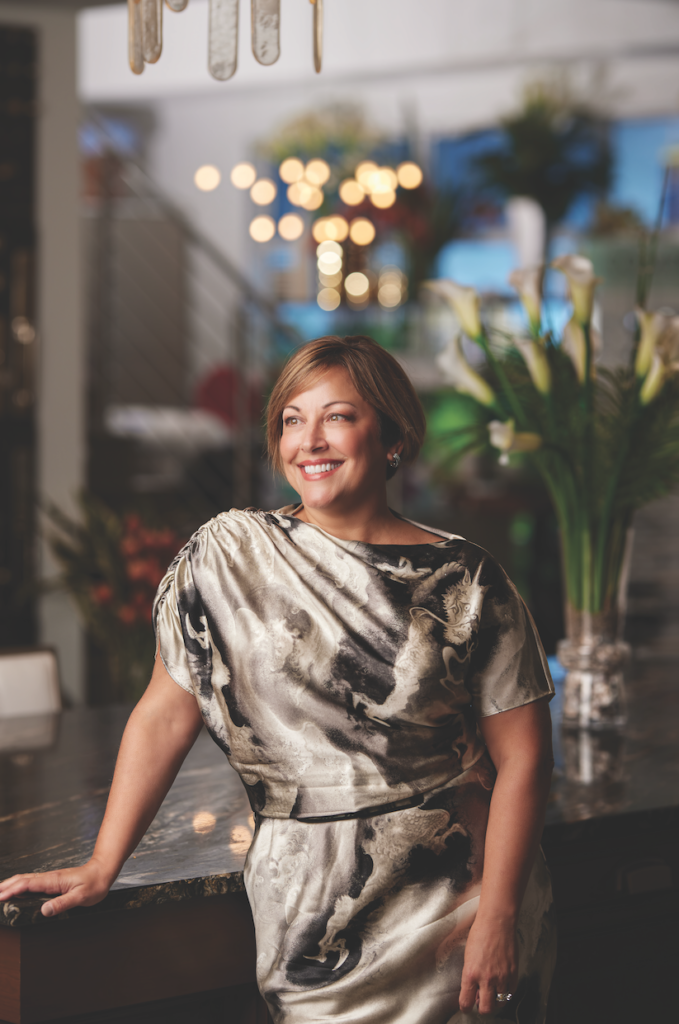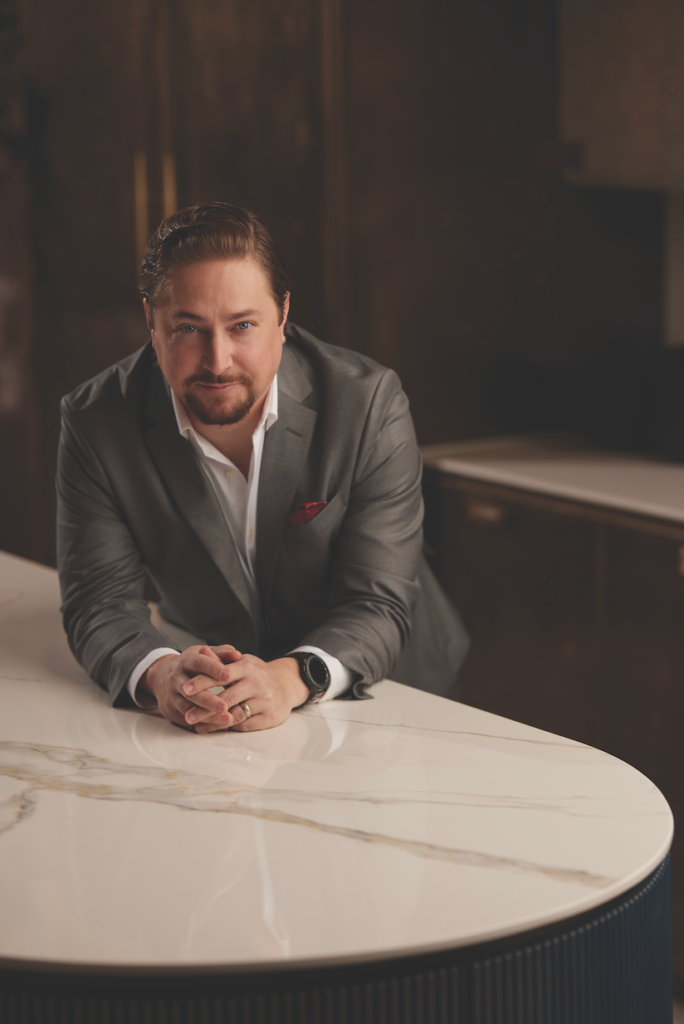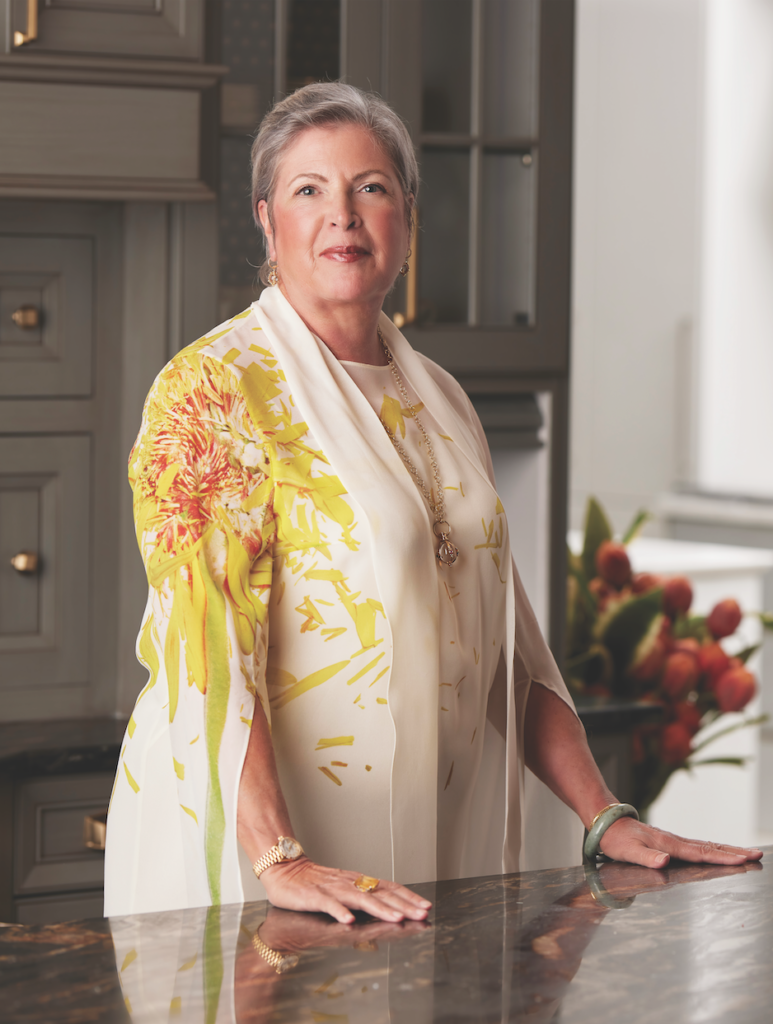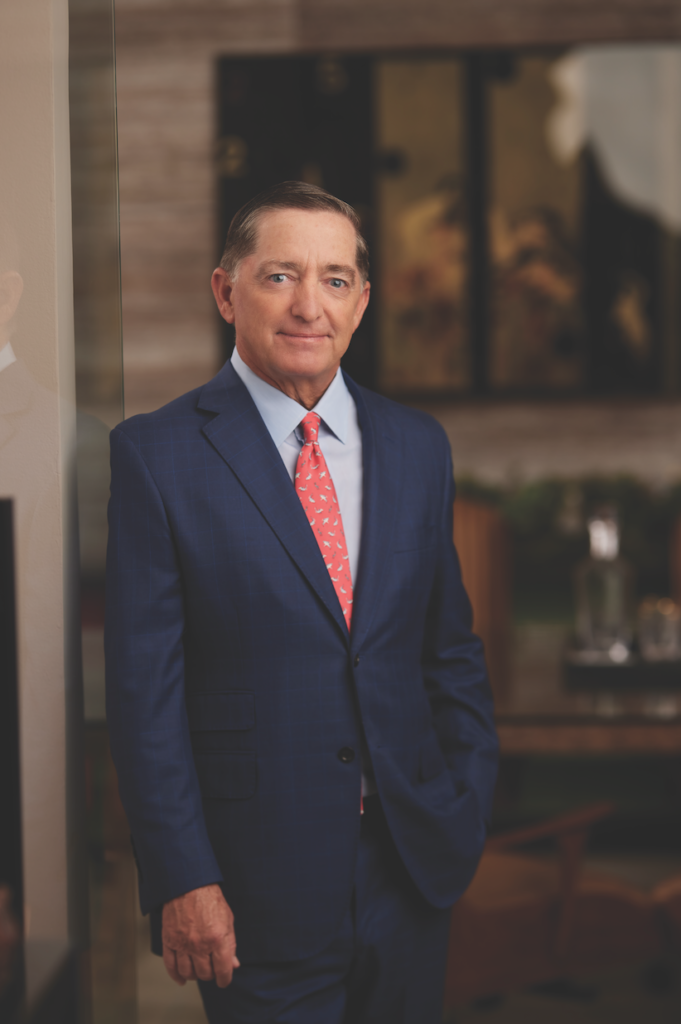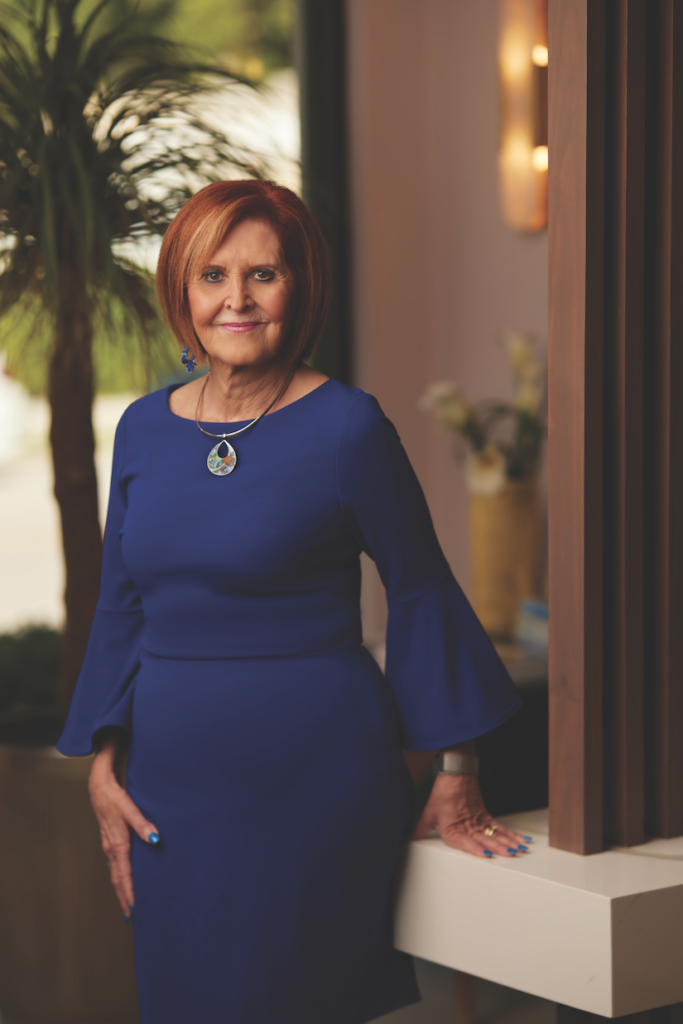Randy Kurtz
Kurtz Homes Co-Founder; The Collective Developer
The first time Randy Kurtz was asked to be on a list like this about 30 years ago, he declined. “I was too busy to do anything but work,” he says.
What changed this year? “My daughters talked me into it,” says Randy, whose daughters, Carolyn and Elizabeth, are now vital parts of Kurtz Homes—located in recently opened The Collective—alongside him.
Randy had the vision for a design hub in the Naples Design District 16 years ago. Back then, he’d bought a parcel of land on 10th Street and First Avenue South with some buddies and started envisioning a building with tenants selected to represent every aspect of luxury home building. But the economy took a turn and it wasn’t until three years ago that the project was re-energized as The Collective.
He enlisted John Cooney, whose Stofft Cooney Architects firm is now also based at The Collective, to design the sleek-lined building, which debuted last November. Randy then recruited some of the finest minds in the business, with an eye toward companies who represent the leading edge of design. METHOD & CONCEPT and AlliKristé Cabinetry were early to sign on. Then, others like Casa Italia, The Luxury Bed Collection and GWT Outdoors joined.
With the space, Randy and his team sought to further establish the Naples Design District as a center for art and design. Amid the cluster of architecture firms, builders, lighting stores and flooring specialists in the area, The Collective stands as a symbol that this is the place to be for all things design. The location also functions as an incubator, gathering forward-thinking professionals in a place where they often interact, ideate and collaborate.
Randy and his family have long helped set the standard for design in Southwest Florida. He and his late father, Ron Kurtz, started the company 39 years ago, and together, they’ve been responsible for the look and feel of many homes dotting neighborhoods like Port Royal and Aqualane Shores.
Since the beginning, they’ve been selective about how many projects they take and for whom, allowing them to overdeliver for exacting clients. “Some years, I turn down more work than I take,” Randy says. “Right now, all the work I’m doing is either in Port Royal or on the beach.”
The company’s tagline is “For Generations,” and it makes sense, given Randy has been hired again and again by families building and rebuilding their homes. Randy has run the show since his father passed away 16 years ago, and he plans for his son-in-law, David Gordon, to take over when he retires—which he says won’t be anytime soon. Working with family isn’t for everyone, but for the Kurtzes, it’s made all the difference. Brothers-in-law John DeAngelis of DeAngelis Diamond and Mitch Melheim of Matthew Mitchell Custom Homes are also involved. “They see things much the same way I do, and they want to be the best for our clients,” he says.
The other secret to his success: “I’m good at hiring great people,” Randy says. And he rarely has to recruit, since people stay for decades.
So, what’s in store for the 61-year-old builder and his company, which celebrates 40 years next summer? “I think in the next 39 years or so I’ll think about retiring,” he says.
—Kristine Gill
Serena Parisi
Student and Advocate
Serena Parisi didn’t expect to become an advocate for survivors of sexual abuse. But when she turned 17, she told her therapist that she had been abused by a trusted male in her life. The abuse started when she was 11 and continued for three years, she shared with her family soon after.
With the help of her mother, Jennifer, Serena decided to pursue legal action against her abuser, eventually securing a permanent injunction against him. “A lot of people don’t understand the magnitude of a restraining order—it was harder to get than most people would assume,” Serena, who is now 21, says. “You lose your Second Amendment right when you have a permanent injunction for protection of a minor.”
But they soon realized the injunction wasn’t enough. It turned out, permanent restraining orders were not public records in the state of Florida, which means even deep background checks would miss these red flags. The family learned the abuser was still able to obtain volunteer positions at local children’s organizations despite his documented history of sexual abuse against a minor.
Philanthropy runs in the Parisi family’s DNA. Serena’s grandparents are longtime supporters of Naples Children & Education Foundation (NCEF), and her mom is entrenched with Lee Health and The Everglades Foundation. “At family dinners, we’d talk a lot about philanthropy,” Jennifer says. “My parents would spend a lot of time talking to my kids about NCEF—what it did, the children’s organizations it helped fund, what it stood for.” Since they were young, Jennifer made it a point to expose her kids to the needs in the community. She would take them to Golisano Children’s Hospital during the holidays to support kids battling life-threatening illnesses, and they’d raise money for scholarships and fundraise at school.
Serena couldn’t stomach the thought that her attacker could harm another kid—especially a vulnerable child being helped by a nonprofit. So, three years ago, she set out on a mission to create a bill that would make these restraining orders part of public record, with the help of attorney and lobbyist Zachary Lombardo. Serena’s Law, as it was named, passed and went into effect this summer.
Thanks to the law, abusers won’t be able to hide these injunctions, and organizations have more pertinent information to determine whether someone is suited to work with at-risk children. It also means you can find out whether the person you’re going on a date with has a sordid past.
Serena says the experience has gotten her thinking about what she’d like to tackle in the future. Currently a junior at the University of Miami, she is pursuing a major in psychology, and also considers a career in law or advocacy work. No matter her track, she will continue to help survivors gain the courage to share their stories and find a community that can help them to heal. “A lot of people will say the wrong things, but there are a lot of people who understand and will listen, so go toward those people,” she says. —K.G.
Marcus Jansen
Artist
You have to admire people with staying power, the ones who understand their time will come.
The time for artist Marcus Jansen, who got his professional start selling paintings on New York City street corners, is right now. For some 25 years, the Fort Myers resident has used his art to provoke questions about power, war, technology, surveillance, economics and injustices. Suddenly, everyone, it seems, is pondering similar matters. “All the things I was painting about all these years—commenting on social issues, the economic issues—it all became relevant and personal to a lot of people,” he says.
His career shifted into overdrive, spurred by social justice rallies, climate change, anti-immigrant fervor, historical reckonings—and an attentive art world. “My biggest issue is not what to paint but what to paint first,” he says. “Things are happening so fast.”
Lately, he’s concerned with the narrow telling of U.S. history and escalating immigration debates. He expanded his “Faceless” series to include militarized, Colonial-era figures, spurring questions about Western domination and its ramifications. The toppling of Confederate statues inspired his new “Monument Wars” paintings. Other works consider walls, both the physical and psychological sort. “We have these barriers between human beings, and those are becoming more extreme as we go along,” he says. The themes are personal: Jansen is the son of a German father and a Jamaican mother, raised in the U.S. and Germany.
Critics, curators, agents and audiences have taken note. The artist, shown more extensively in Europe than in the U.S., had his first solo shows at domestic museums over the past year, at the Cornell Fine Arts Museum (now Rollins Museum of Art) in Winter Park and Artis—Naples, The Baker Museum. A painting displayed at the former caught the eye of acclaimed contemporary art dealer Almine Rech, who asked to represent him internationally in collaboration with the Richard Beavers Gallery in Brooklyn. The Bronx Museum of the Arts recently purchased a piece for its permanent collection, the first museum in New York to have done so—fittingly as it is Jansen’s childhood home and the location of his second studio space.
Jansen hopes his works encourage reflection and conversation. “My paintings don’t offer answers, unfortunately, but they definitely pose questions,” he says.
He wants to affect change in other ways, too. In 2019, he launched the Marcus Jansen Foundation Fund, administered by Collaboratory (formerly Southwest Florida Community Foundation). It seeks to bring art to economically disadvantaged youth and art therapy to veterans suffering from post-traumatic stress disorder. “Art saved my life,” explains Jansen, a U.S. Army veteran who saw combat during the First Gulf War. He also directed a portion of the proceeds from a recent show to benefit Mott Haven Community Fridge, a nonprofit founded by sixth-grade teachers to fight food insecurity in the Bronx. “I’m inspired by these communities,” he says. “It’s important for me to give back.” —Jennifer Reed
Tracey Galloway
Community Advocate
Tracey Galloway may have stepped down from her role as CEO of Community Cooperative in June, but she still says “we” when she talks about the longstanding nonprofit that her father-in-law, the late Sam Galloway Jr., started in 1985. That’s not just out of habit; Tracey is still involved with the organization, working as a volunteer for the Meals on Wheels program and advocating for the group behind the scenes. “I’ll continue to be the loudest voice in the community to support the organization,” she says.
Last year, with the onset of the COVID-19 pandemic, food insecurity skyrocketed. Tracey and her team doubled the number of mobile food pantry sites and quickly shifted from a walk-up to a drive-thru system to limit physical contact. “With hurricanes and natural disasters, we have playbooks that we go by, we know what we’re doing, where the food comes from, because we’ve been through it before,” she says. “But when COVID came, we just rolled up our sleeves and went with it.”
Community Cooperative was also one of the first local nonprofits to host an in-person fundraiser in May, raising $1.3 million at the Sam Galloway, Jr. & Friends Soup Kitchen Benefit.
Sam initially launched the kitchen as a church mission to help his neighbors in need—a sentiment that Tracey carried with her before taking over the family operation. On her first day at Community Cooperative in 2011, she was greeted by a social worker who she recognized as a former student she mentored while working as vice president of development for Edison State College Foundation (now known as Florida SouthWestern State College). The last time Tracey saw her, she was living out of her car; Tracey had helped her get new clothes and financial aid. “To see her come full circle like that made me know I was doing the right thing,” she says. “Not many people get to work with something they’re really passionate about.”
When the board of directors recruited her, Tracey was tasked with rebuilding the organization that she described as then “not knowing what it wanted to be when it grew up.” First, she shifted the nonprofit to operate more like a small business, paying close attention to the cost and benefit of its existing programs. She closed the soup kitchen’s on-site daycare program and partnered with Childcare of Southwest Florida—which is right down the road—to eliminate redundancy between the nonprofits. More recently, she worked to create an endowment fund to sustain the organization in the future. And, just before the pandemic hit, she launched Community Market within Sam’s Community Café & Kitchen, where locals can choose their own groceries from the shelves instead of receiving a prepackaged kit.
After 10 years, Tracey says it’s the perfect time to pass the torch to her successor Stefanie Ink Edwards. “In nonprofits, I think it’s really important to have fresh leadership,” Tracey says. “I told her when I was leaving, ‘Don’t be afraid to make it yours.’” —Jaynie Bartley
Bryce Alexander
The Naples Players Executive Artistic Director
We love the action that unfolds on stage at Sugden Community Theatre, home to The Naples Players (TNP). Equally intriguing: the troupe’s off-stage activities, from its pandemic response to new community partnerships to its commitment to wellness and inclusivity.
At center stage is executive artistic director Bryce Alexander, who proved to be a master of improvisation when the 2019-2020 season went off script. Costume and set designers raced to stitch face masks and design plexiglass intubation boxes for medical workers. The theater went dark, but the troupe lit up the internet with concerts, comedy shows, educational programs, wellness offerings and even a full-length virtual play—the majority of it free. For a time, the nonprofit theater company moved outdoors, staging shows at Baker and Cambier Parks and at the Naples Zoo, where it produced a one-of-a-kind rendition of “Madagascar Jr.,” featuring young, animal-costumed performers along with real-life critters and zookeepers. “It allowed us to show the synergies between art and science,” Alexander says. “It’s too bad it took a global pandemic to teach us that lesson.”
The crisis brought renewed commitment to the nonprofit’s central tenet: That the arts are among a community’s core institutions—not an amenity on its margins. “We thought, ‘How can we serve the community?’ And, in turn, the community served us,” Alexander says.
Donors and smart in-house management allowed TNP to weather the financial crunch. Since the pandemic’s start, TNP has added seven staff and, this fall, launched a $15 million capital campaign to include theater renovations and expansions.
Alexander anticipates a traditional upcoming season, but hardly a return to status quo. The success of the virtual programs—212 classes, 24,000 audience members and 11,600 online students in 2020—prompted the company to reassess how it delivers programming and how it reaches beyond its downtown Naples core.
New collaborations have emerged. These include a program with the Naples Therapeutic Riding Center that combines equine and improv therapy and an agreement with the Collier County Public Schools to install theater programs in middle and high schools. Though TNP sustained $1.6 million in pandemic losses, the troupe still prioritizes looking outward, staging fundraisers to help other area nonprofits, such as a campaign built around the show “Calendar Girls” to address food insecurity. “Everybody is always raising money for themselves,” Alexander says. “We asked: ‘Why don’t we raise money for other organizations that benefit our community?’ It feels radical, but it is the basis of being a community-centric organization. We’re excited to continue that.”
—J.R.
Rose O’Dell King
Rosy Tomorrows Heritage Farm Owner/Operator
Rose O’Dell King wants to change how food tastes. She also wants to change how we, as consumers, taste food. Global conglomerates’ overly processed foods have ruined our taste buds, she believes, and she plans to reverse that, one palate at a time. “So many have lost touch with how food should taste,” she says.
King does not hesitate to speak frankly about the state of American farming and eating. She writes weekly newsletters to educate her community supported agriculture (CSA) members. But the owner of Rosy Tomorrows Heritage Farm in North Fort Myers is about more than just words. For eight years, she and her husband, Gary, have followed organic practices to raise heritage, grass-fed livestock. She also grows heirloom veggies, greens and herbs; scrapes salt off leaves in a secret mangrove stand in Matlacha Pass; and buys what she doesn’t grow and raise herself from local fishermen, shrimpers, fruit growers and beekeepers.
The French Culinary Institute-trained chef, King turns this bounty into sustainable culinary creations at her on-the-farm restaurant. “It starts because we’re connected to these hundred acres,” she says. “We are of this place. Everything we do is so everyone can experience that, here in our restaurant, in the moment.”
As a definitive farm-to-table operation, Rosy Tomorrows’ name reflects the hope King holds onto in these times, when large companies and their control over the food supply endangers small family farms and restaurants. After closing during the pandemic shutdown, she expanded her screened restaurant to accommodate social distancing and to offer more outdoor dining, while adding seating and fire pits for sipping wine and botanical cocktails. “People saw how fragile the food system was at the beginning of the pandemic and still is,” she says. The chef’s operation is community-supported even beyond its CSA program: Her 104-seat dining room is full almost every time it’s open (Thursday, Friday, Saturday and Sunday evenings and Sunday mornings)—a sign the regenerative farming she espouses is gaining traction locally. “The restaurant experience helps to reconnect them to the food of our ancestry,” she says of her loyal following. “Our mission is to bring people back to that way of unadulterated food.”
—Chelle Koster Walton
Paul Hiltz
NCH President/CEO
Paul Hiltz’s appointment as CEO of the Naples Community Hospital (NCH) in 2019 marked the end of a tumultuous time for the medical institution, which was coming off the controversy of a no-confidence vote by physicians for the previous CEO.
Hiltz, formerly head of Mercy Medical Center in Canton, Ohio, had been selected for the role unanimously for his ability to gain consensus and build trust. And the first point of business, as he saw it, was to listen. Hiltz hosted employee town halls and made a point to be more transparent about leadership’s plans and goals for the hospital system. “I’ve enjoyed listening to our staff and physicians and learning from their insights to ensure we have a collaborative culture focused around quality patient care,” he says.
Creating trust with staff enabled Hiltz to quickly pivot and lead the hospital through a pandemic while continuing to develop major projects and strategic initiatives.
From the get-go, Hiltz was clear with the team that he wanted to fast-track NCH’s path to becoming a top 100 hospital in America for cardiac care. In April, Hiltz named Dr. Robert Cubeddu—who was previously with Cleveland Clinic Florida, part of the hospital group that’s consistently ranked as No. 1 in the U.S. for its cardiac program—president of the NCH Heart Institute. The goal is to grow the department into a world-class cardiology program with patients traveling there for treatment and students coming to learn.
A month later, the 8,000-square-foot Judith & Marvin Herb Family Simulation Center opened with the aid of a $5 million gift from the namesake patrons. The center allows practitioners to train through realistic scenarios with advanced technology and mannequins, reducing risk to patients and enhancing young doctors’ education. “We’ve already started seeing the impact, as we’ve learned new treatments to take care of COVID patients,” Hiltz says.
Capping off the summer was the opening of the renovated Whitaker Wellness Center, complete with upgrades to occupational and employee health areas. And, visitors this fall will notice major upgrades to the emergency room when the $35 million renovation wraps. —K.G.
Dr. Sandra Kauanui
FGCU Entrepreneurship School Director
Young entrepreneurs are the lifeblood of a growing community like Southwest Florida, and at Florida Gulf Coast University, Dr. Sandra Kauanui has fostered a breeding ground for those who hustle.
On a Tuesday afternoon, the recently opened Lucas Hall, a collaborative space for the Daveler & Kauanui School of Entrepreneurship, buzzes as students and faculty brainstorm in the glass-enclosed offices and incubator space on the first floor; tinker with 3D printers in the Rist Family Foundation Maker Space on the second floor and with greenscreens in the soundproofed third-floor labs; and collaborate in classrooms throughout. After longtime FGCU supporter David Lucas’ $4 million gift for the $10.4 million, three-story building that was funded completely through donations, Kauanui, the school’s founding director, helped stimulate support by pledging $200,000—a little more than a year’s worth of her salary—toward the effort.
Walking through the incubator with Kauanui—whose leadership won the school a Bronze Edison Award as an innovative model of entrepreneurship education (though she humbly omits that detail)—she greets every student by name and can brief you on their passion projects on the spot. “Kids from all over campus can come in and if they have a business idea, we can help them create it,” she says. For the students, it’s a chance for hands-on, mentor-focused learning to kick-start their careers; for faculty, it’s an opportunity to see their impact firsthand; for the community, it’s a catalyst for economic growth. For Kauanui, it’s simply “my baby.”
When she moved here from California 14 years ago, Kauanui had already raised a family and ran her own accounting and finance company, all while earning her bachelor’s, master’s and most of her doctorate degree. She was teaching at California Polytechnic State University and was considering retirement when FGCU recruited her to teach. Since then, she’s fueled the university’s entrepreneurship program, establishing a minor to complement the business school in 2014. As interest grew (“We had 500 kids in no time,” she says), Kauanui continued to expand the school’s reach. In 2016, she lobbied to create the school’s Runway Program, where students and alumni can access technology, seek faculty advice and even potentially secure seed funding to launch their businesses. In 2017, she established the program as a major; in 2019 she created the school; and this fall semester, there’s the Lucas Hall and a graduate program. Already, efforts have resulted in more than 500 mostly local startups created by students and alumni earning about $37.5 million in gross revenue. “The whole goal is to create an entrepreneurial ecosystem in Southwest Florida,” she says.
—J.B.

